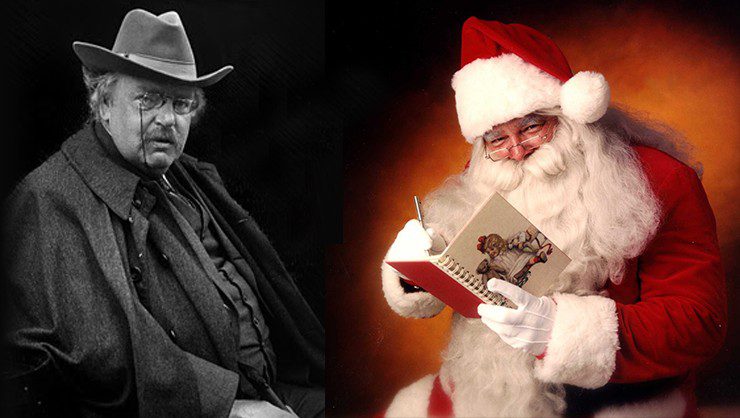LifeSite journalist Kennedy Hall has written a piece for the Catholic publication Crisis entitled I Believe in Santa in which he tells about how Santa Claus helped him recover his faith as an adult. (He calls himself not a “convert” but a “revert.”)
In the course of this unusual but interesting testimony, he gives a quotation from G. K. Chesterton, which I identified with great difficulty as coming from the essay “The Other Stocking” published in the London Tablet in 1904. (I can’t find the entire piece online, nor have I found it in any modern collection–if any of you can find it, let us know in the comments.) Here it is with my paragraphing and my bolds:
What has happened to me has been the very reverse of what appears to be the experience of most of my friends. Instead of dwindling to a point, Santa Claus has grown larger and larger in my life until he fills almost the whole of it.
It happened in this way. As a child I was faced with a phenomenon requiring explanation. I hung up at the end of my bed an empty stocking, which in the morning became a full stocking. I had done nothing to produce the things that filled it. I had not worked for them, or made them or helped to make them. I had not even been good—far from it. And the explanation was that a certain being whom people called Santa Claus was benevolently disposed toward me…
What we believed was that a certain benevolent agency did give us those toys for nothing. And, as I say, I believe it still. I have merely extended the idea. Then I only wondered who put the toys in the stocking; now I wonder who put the stocking by the bed, and the bed in the room, and the room in the house, and the house on the planet, and the great planet in the void.
Once I only thanked Santa Claus for a few dolls and crackers. Now, I thank him for stars and street faces, and wine and the great sea. Once I thought it delightful and astonishing to find a present so big that it only went halfway into the stocking. Now I am delighted and astonished every morning to find a present so big that it takes two stockings to hold it, and then leaves a great deal outside; it is the large and preposterous present of myself, as to the origin of which I can offer no suggestion except that Santa Claus gave it to me in a fit of peculiarly fantastic goodwill.
This is to say, Santa Claus taught him about grace. Interestingly, this is not the usual Catholic view of grace, which one might expect from Chesterton and a writer for the Crisis. This is grace as unmerited favor.
The point for both Kennedy Hall and G. K. Chesterton is that the figure of Santa Claus taught them experientially the concept of grace, which they later found fulfilled in the Christian faith.
I do not present this quotation as a reason to do the whole Santa Claus thing with your children. In trying to dig out the source of this quotation–which ChatGPT did not help me with, giving once more a wrong citation that it stated as the definitive answer, then admitting that it didn’t know only after I challenged it–I noticed that Catholics seem to do more with Santa than Protestants do. It made me realize that Santa Claus is technically a saint’s legend. There is a long tradition in Catholicism of using highly-fictionalized tales of saints for teaching and devotion, and St. Nicholas coming at Christmas is only a more extreme example. Catholics and Orthodox–for whom St. Nicholas is particularly significant–see saints as spiritual agents and mediators. We Protestants see Christ alone in that role, so we are more leery of the danger of making Santa a substitute for Jesus. But we Lutherans believe that we can learn from the saints.
(We never taught our children that Santa was real, but we did make him a fun and funny story. And we did tell them about the real St. Nicholas and his connection to Christmas, as one of the confessors of the Incarnation who gave us the Nicene Creed.)
The main reason I present this quotation is that in this age that believes that reality is only a mental construction or an imposition of power or a computerized matrix or some other Gnostic fantasy, it is important that we recover the value of physical reality. Contrary to what we are told, existence is not meaningless. The universe is not just random, dead matter. Rather, the universe is wondrous, mysterious, and amazing, and more so the more we learn about it. And our own existence is a miraculous gift.
Chesterton expresses this in an infectious way in pretty much everything he wrote, including the hundreds of brief journalism pieces–like “The Other Stocking”–many of which have not even been collected yet.
Here you can buy a Kindle version of Chesterton’s Collected Works (which is not, however, complete) for only $1.99. Start with Orthodoxy, Heretics, and Everlasting Man.
Illustration via Brandon Vogt. A Photoshop of this image of Santa Claus from a blogging resource and this public domain photograph of Chesterton.












